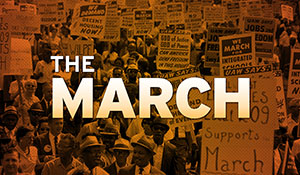In Case You Missed It
August 27, 2013 Leave a Comment
The world we live in is media saturated. How could you possibly watch everything you want to when it airs on TV at whatever time eastern/the time that really matters central. Here are a few shows you may have missed that live on via the Web and can be watched anytime that matters to you.
POV “5 Broken Cameras”
What would you do if you woke up one morning to find a construction crew altering the landscape around you. In the 21st century, a logical reaction might be to grab a video camera and start recording. That’s exactly what filmmaker Emad Burnat did when Israel began constructing a security fence in his West Bank village, Bil’in in 2005.
Burnat’s Oscar nominated film is an account of life and nonviolent resistance, and it’s deeply personal (after all, he bought his first camera to record his newborn son). In a 24-hour news world in which most accounts of Israeli-Palestinian relations include violence alone, “5 Broken Cameras” offers a unique perspective by showing us life in the region through the lens of an average citizen.
In its review, The New York Times eloquently states “[the film] is partly a piece of advocacy journalism. But it is also a visual essay in autobiography and, as such, a modest, rigorous and moving work of art.”
The March @ 50
 A majority of media are looking to the past this week by honoring the historic 1963 March on Washington. WPT is among that majority, but we’re also part of a small group that is asking “what’s in store for the future of Black America?”
A majority of media are looking to the past this week by honoring the historic 1963 March on Washington. WPT is among that majority, but we’re also part of a small group that is asking “what’s in store for the future of Black America?”
The March @ 50 is a web series companion to the historical doc The March that examines the major themes of the March on Washington through a contemporary lens. Each 5-7 minute episode looks at the disparity in Jobs, Freedom, Equal Education and Voting Rights between whites and blacks as it was in 1963 compared to 2013.
Episode 1: Jobs reveals that while average unemployment among blacks ebbs and flows just as it does among whites, black unemployment has consistently been two times higher than white unemployment – over 19% at its worst.
Featuring hard hitting statistics and interviews with leading researchers and community leaders, The March @ 50 is an important piece of journalism that will help carry forth the marchers’ mission for the next 50 years.
PBS NewsHour “Do Innocent Citizens Risk Police Seizure of Their Property?”
 Over the weekend an article published in The New Yorker made its way around the web. The focus was civil forfeiture: a little known policy that makes it ok for law enforcement to seize property (your car, cash, jewelry, even your kids) upon the faintest suspicion of criminal activity. No charges need to be filed, no guilty verdict…nothing. Just your word against theirs.
Over the weekend an article published in The New Yorker made its way around the web. The focus was civil forfeiture: a little known policy that makes it ok for law enforcement to seize property (your car, cash, jewelry, even your kids) upon the faintest suspicion of criminal activity. No charges need to be filed, no guilty verdict…nothing. Just your word against theirs.
Sounds a bit unjust right? It can be if used the wrong way. But it can also be a benefit to society. Many a public service has been funded by the yachts and mansions of drug dealers.
Whether used for good or for evil, civil forfeiture came to light in a big way in the The New Yorker article. It’s a long read (30 minutes in and I’m just over half way through it). So for the time crunched, I recommend you check out Ray Suarez’s 6 minute interview with the author Sarah Stillman.
 Passport
Passport





